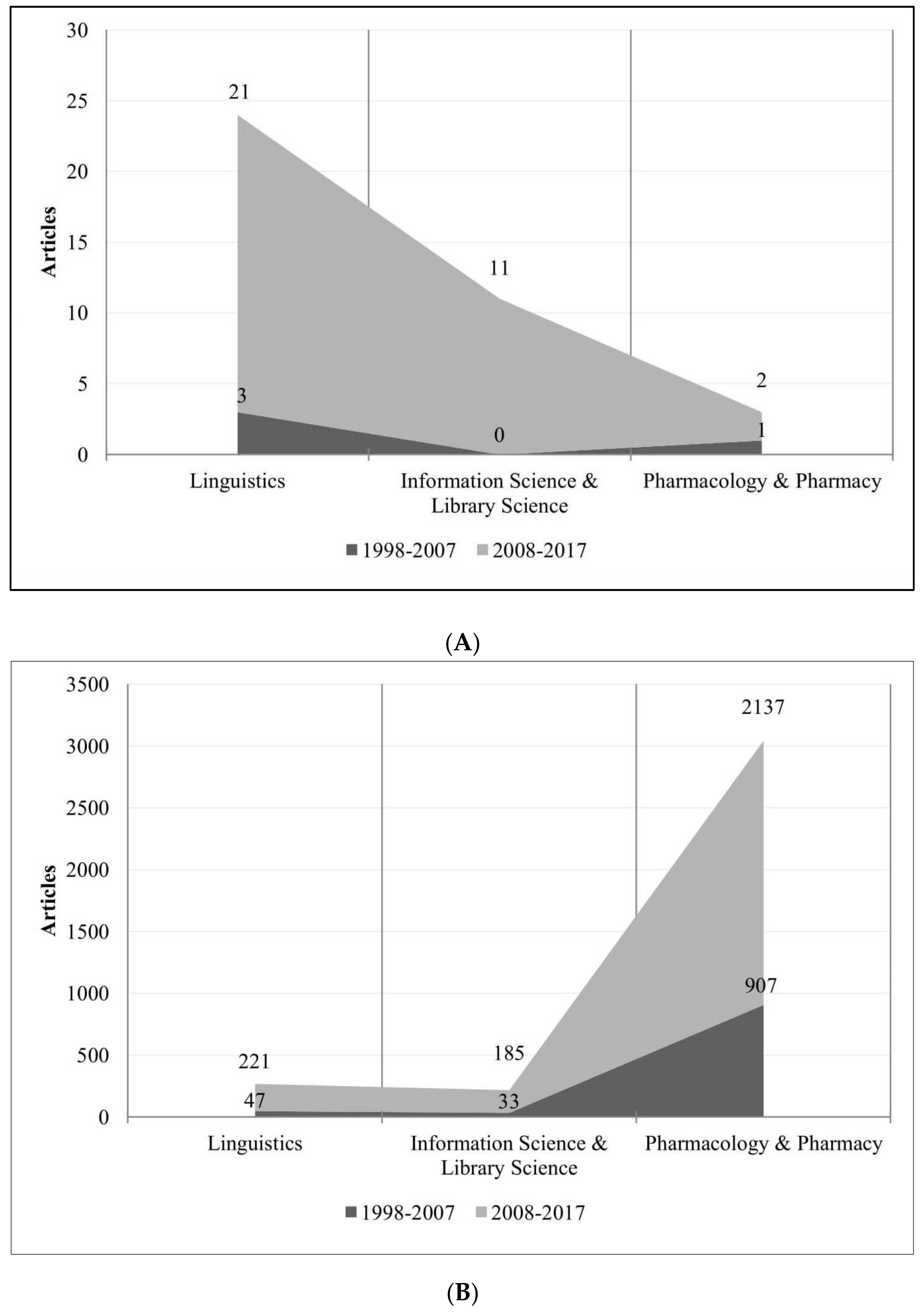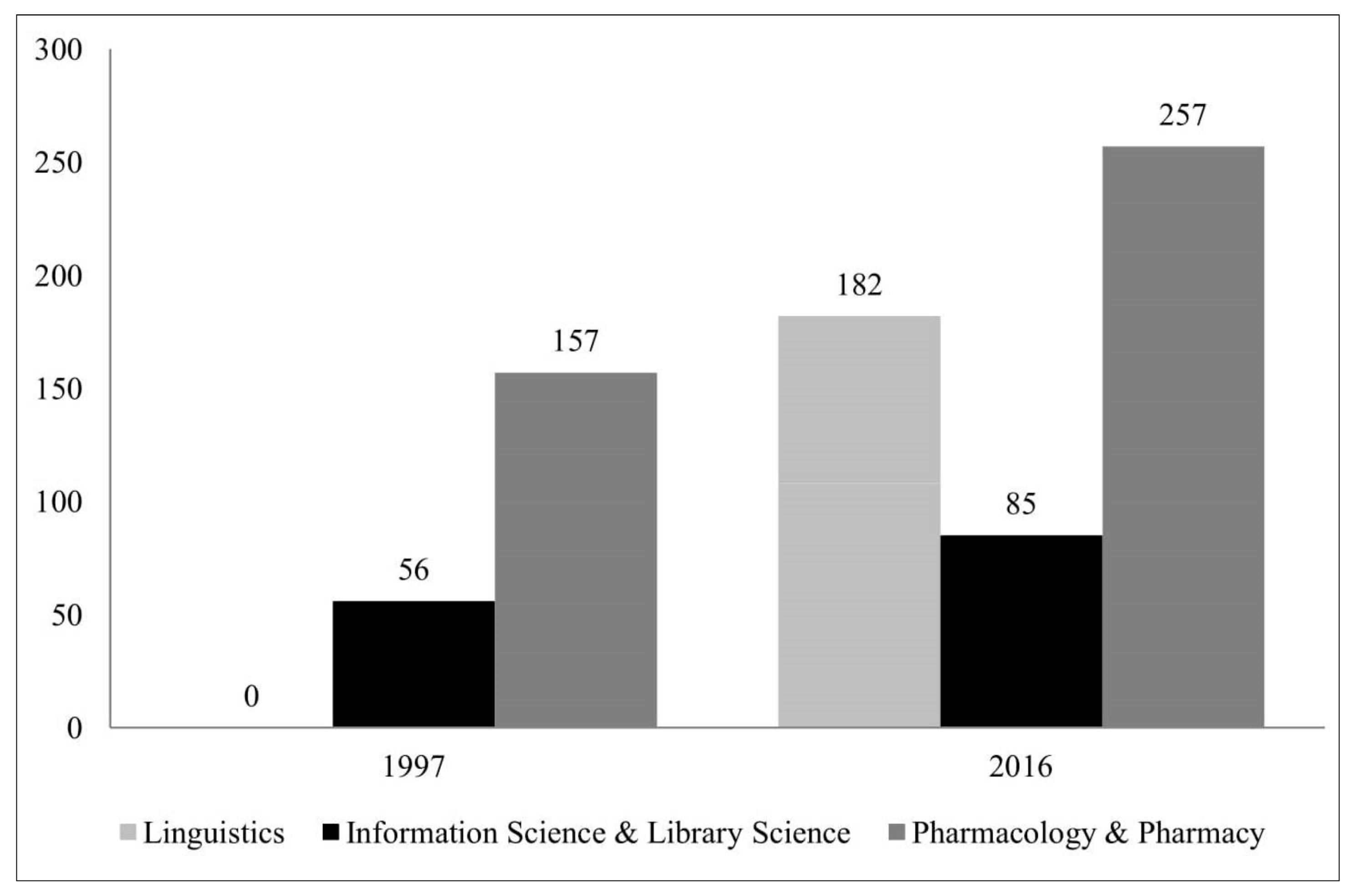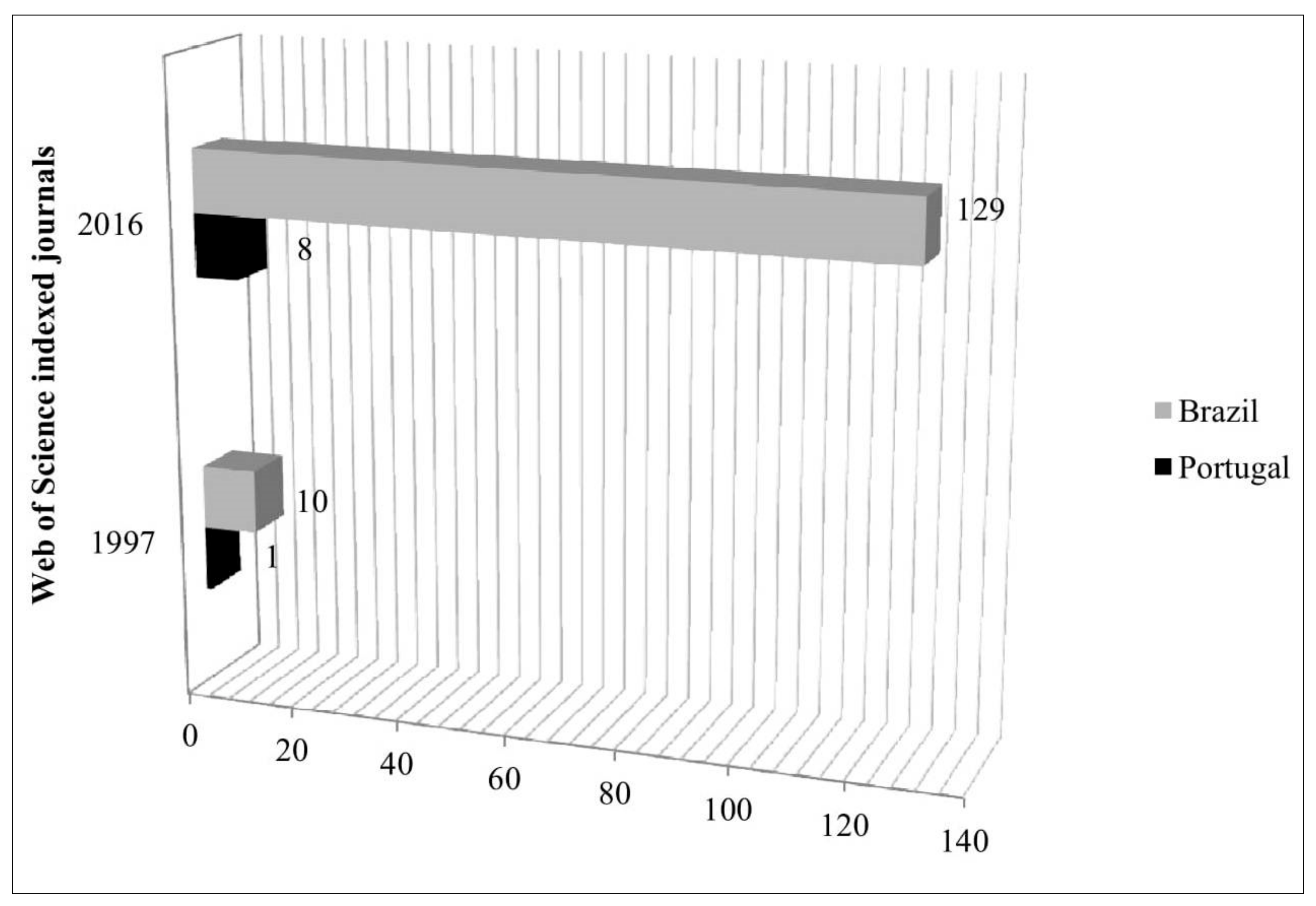Publish in English or Perish in Portuguese: Struggles and Constraints on the Semiperiphery
Abstract
1. Introduction
2. Theoretical Assumptions
2.1. Research Communities and Authorial Voice
2.2. Issues of Historicity, Pluricentricity and Semi-Periphery in Rhetorical Conventions
2.3. Academic Practices and Marketization
3. Methodological Procedure
4. Analysis and Discussion of Results
4.1. Distribution of Articles over a 20-Year Period (1998–2017)
4.2. Distribution of Journals over a 20-Year Period
5. Conclusions
Author Contributions
Acknowledgments
Conflicts of Interest
References
- Swales, J. English as a Tyrannosaurus Rex. World Engl. 1997, 16, 373–382. [Google Scholar] [CrossRef]
- Bennett, K. Towards an epistemological monoculture: Mechanisms of epistemicide in European research publication. In English as a Scientific and Research Language; Pló Alastrué, R., Pérez-Llantada, C., Eds.; Walter de Gruyter: Berlin, Germany; Boston, MA, USA, 2015; pp. 9–35. [Google Scholar]
- Burgess, S. Packed houses and intimate gatherings: Audience and rhetorical structure. In Academic Discourse; Flowerdew, J., Ed.; Pearson Education: Harlow, UK, 2002; pp. 196–215. [Google Scholar]
- Van Bonn, S.; Swales, J. English and French journal abstracts in the language sciences: Three exploratory studies. J. Engl. Acad. Purp. 2007, 6, 93–108. [Google Scholar] [CrossRef]
- Hyland, K. Academic Discourse. English in a Global Context; Continuum International Publishing Group: London, UK, 2009. [Google Scholar]
- Bennett, K.; Muresan, L.-M. Rhetorical Incompatibilities in Academic Writing: English versus the Romance Cultures. Synergy 2016, 12, 95–119. [Google Scholar]
- Ferguson, G. The global spread of English, scientific communication and ESP: Questions of equity, access and domain loss. Ibérica 2007, 13, 7–38. [Google Scholar]
- Flowerdew, J. Discourse Community, Legitimate Peripheral Participation, and the Non-Native-English-Speaking Scholar. TESOL Q. 2000, 34, 127–150. [Google Scholar] [CrossRef]
- Curry, M.J.; Lillis, T. Multilingual Scholars and the Imperative to Publish in English: Negotiating Interests, Demands, and Rewards. TESOL Q. 2004, 38, 663–688. [Google Scholar] [CrossRef]
- Tardy, C. The role of English in scientific communication: Lingua franca or Tyrannosaurus Rex? J. Engl. Acad. Purp. 2004, 3, 247–269. [Google Scholar] [CrossRef]
- Englander, K. Revision of scientific manuscripts by nonnative English scientists in response to journal editors’ criticism of the language. J. Appl. Linguist. 2006, 3, 129–161. [Google Scholar]
- Li, Y.; Flowerdew, J. Shaping Chinese novice scientists’ manuscripts for publication. J. Second Lang. Writ. 2007, 16, 100–117. [Google Scholar] [CrossRef]
- Uzuner, S. Multilingual scholars’ participation in core/global academic communities: A literature review. J. Engl. Acad. Purp. 2008, 7, 250–263. [Google Scholar] [CrossRef]
- Curry, M.J.; Lillis, T. Academic Research Networks: Accessing resources for English-medium publishing. Engl. Specif. Purp. 2010, 29, 281–295. [Google Scholar] [CrossRef]
- Lillis, T.; Curry, M.J. Academic Writing in a Global Context. The Politics and Practices of Publishing in English; Routledge: London, UK, 2010. [Google Scholar]
- Pérez-Llantada, C.; Plo, R.; Ferguson, G. “You don’t say what you know, only what you can”: The perception and practices of senior Spanish academics regarding research dissemination in English. Engl. Specif. Purp. 2011, 30, 18–30. [Google Scholar] [CrossRef]
- Hyland, K. Academic Publishing. Issues and Challenges in the Construction of Knowledge; Oxford University Press: Oxford, UK, 2012. [Google Scholar]
- Martín, P.; Rey-Rocha, J.; Burgess, S.; Moreno, A. Publishing research in English-language journals: Attitudes, strategies and difficulties of multilingual scholars of medicine. J. Engl. Acad. Purp. 2014, 16, 57–67. [Google Scholar] [CrossRef]
- Salager-Meyer, F. Writing and publishing in peripheral scholarly journals: How to enhance the global influence of multilingual scholars? J. Engl. Acad. Purp. 2014, 3, 78–82. [Google Scholar] [CrossRef]
- Bocanegra-Valle, A. ‘English is my default academic language’. Voices from LSP scholars publishing in a multilingual journal. J. Engl. Acad. Purp. 2014, 13, 65–77. [Google Scholar] [CrossRef]
- Muresan, M.; Pèrez-Llantada, C. English for research publication and dissemination in bi/ multilateral environments: The case of Romanian academics. J. Engl. Acad. Purp. 2014, 13, 53–64. [Google Scholar] [CrossRef]
- Bardi, M. Learning the practice of scholarly publication in English—A Romanian perspective. Engl. Specif. Purp. 2016, 37, 98–111. [Google Scholar] [CrossRef]
- Davies, A. The Native Speaker: Myth and Reality; Multilingual Matters: Clevedon, UK, 2003. [Google Scholar]
- Ferguson, G.; Pérez-Llantada, C.; Pló, R. English as an international language of scientific publication: A study of attitudes. World Engl. 2011, 30, 41–59. [Google Scholar] [CrossRef]
- Bocanegra-Valle, A. Peer-reviewers’ recommendations for language improvement in research writing. In English as a Scientific and Research Language; Pló Alastrué, R., Pérez-Llantada, C., Eds.; Walter de Gruyter: Berlin, Germany, Boston, MA, USA, 2015; pp. 207–230. [Google Scholar]
- Hyland, K. Academic publishing and the myth of linguistic injustice. J. Second Lang. Writ. 2016, 31, 58–69. [Google Scholar] [CrossRef]
- National Science Board USA-SEI 2018, Science and Engineering Indicators 2018. Available online: https://www.nsf.gov/statistics/2018/nsb20181/ (accessed on 30 January 2018).
- Liu, W. The changing role of non-English papers in scholarly communication: Evidence from Web of Science’s three Citation Indexes. Learn. Publ. 2017, 30, 115–123. [Google Scholar] [CrossRef]
- Gonçalves, P. O Português em África. In Gramática do Português; Raposo, E.B.P., Ed.; Fundação Calouste Gulbenkian: Lisboa, Portugal, 2013; Volume 2, pp. 157–178. [Google Scholar]
- Hyland, K. Different Strokes for Different Folks: Disciplinary Variation in Academic Writing. In Language and Discipline. Perspectives on Academic Discourse; Fløttum, K., Ed.; Cambridge Scholars Publishing: Newcastle, UK, 2007; pp. 89–108. [Google Scholar]
- Lave, J.; Wenger, E. Situated Learning: Legitimate Peripheral Participation; Cambridge University Press: Cambridge, UK, 1998. [Google Scholar]
- Hymes, D.H. Linguistic problems in defining the concept of ‘tribe’. In Essays on the Problem of Tribe; Helm, J., Ed.; American Ethnological Society and University of Washington Press: Seattle, WA, USA, 1968; pp. 23–48. [Google Scholar]
- Swales, J. Genre Analysis. English in Academic and Research Settings; Cambridge University Press: Cambridge, UK; New York, NY, USA, 1990. [Google Scholar]
- Tardy, C.; Matsuda, P. The Construction of Author Voice by Editorial Board Members. Writ. Commun. 2009, 26, 32–52. [Google Scholar] [CrossRef]
- Fløttum, K.; Dahl, T.; Kinn, T.; Gjesdal, A.M.; Vold, E.V. Cultural Identities and Academic Voices. In Language and Discipline. Perspectives on Academic Discourse; Fløttum, K., Ed.; Cambridge Scholars Publishing: Newcastle, UK, 2007; pp. 14–39. [Google Scholar]
- Tardy, C. Current Conceptions of Voice. In Stance and Voice in Written Academic Genres; Hyland, K., Sancho-Guinda, C., Eds.; Palgrave MacMillan: London, UK, 2012; pp. 34–48. [Google Scholar]
- Ivanič, R. Writing and Identity: The Discoursal Construction of Identity in Academic Writing; John Benjamins: Amsterdam, The Netherlands, 1998. [Google Scholar]
- Dressen-Hammouda, D. Measuring the voice of disciplinarity in scientific writing: A longitudinal exploration of experienced writers in Geology. Engl. Specif. Purp. 2014, 34, 14–25. [Google Scholar] [CrossRef]
- Kubota, R. Striving for Original Voice in Publication? A Critical Reflection. In Writing for Scholarly Publication. Behind the Scenes in Language Education; Casanave, C.P., Vandrick, S., Eds.; Routledge: New York, NY, USA, 2002; pp. 61–69. [Google Scholar]
- Blommaert, J. Discourse: A Critical Introduction; Cambridge University Press: Cambridge, UK, 2005. [Google Scholar]
- Muhr, R. Manufacturing linguistic dominance in pluricentric languages. In Pluricentric Languages: New Perspectives in Theory and Description; Muhr, R., Marley, D., Eds.; Peter Lang: Frankfurt, Germany, 2015; pp. 13–54. [Google Scholar]
- Canagarajah, A.S. A Geopolitics of Academic Writing; University of Pittsburgh Press: Pittsburgh, PA, USA, 2002. [Google Scholar]
- Santos, B.S. Portugal: Um Retrato Singular; Edições Afrontamento: Lisboa, Portugal, 1993. [Google Scholar]
- Bennett, K. The Semiperiphery of Academic Writing. Discourses, Communities and Practices; Palgrave Macmillan: London, UK, 2014. [Google Scholar]
- Bennett, K. Epistemicide! The tale of a predatory discourse. Translator 2007, 13, 151–169. [Google Scholar] [CrossRef]
- Kaplan, R. Cultural thought patterns in intercultural education. Lang. Learn. 1966, 16, 1–20. [Google Scholar] [CrossRef]
- Bennett, K. Academic Writing in Portugal; Imprensa da Universidade: Coimbra, Portugal, 2011. [Google Scholar]
- Duchêne, A.; Heller, M. Language in Late Capitalism: Pride and Profit; Routledge: New York, NY, USA; London, UK, 2012. [Google Scholar]
- García, O.; Bartlett, L.; Kleifgen, J. From biliteracy to pluriliteracies. In Handbook of Multilingualism and Multilingual Communication; Auer, P., Wei, L., Eds.; Mouton de Gruyter: The Hague, The Netherlands, 2007; pp. 207–228. [Google Scholar]
- Fairclough, N. Critical Discourse Analysis and the marketization of Public Discourse: The Universities. Discourse Soc. 1993, 4, 133–168. [Google Scholar] [CrossRef]
- European Commission. Promoting Language Learning and Linguistic Diversity. An Action Plan 2004–2006; Commission of the European Communities: Brussels, Belgium, 2003. [Google Scholar]
- Da Silva, E.; McLaughlin, M.; Richards, M. Bilingualism and the globalized new economy: The commodification of language and identity. In Bilingualism: A Social Approach; Heller, M., Ed.; Palgrave Macmillan: Basingstoke, UK; New York, NY, USA, 2007; pp. 183–206. [Google Scholar]
- Lorés-Sanz, R.; Mur-Dueñas, P.; Lafuente-Millán, E. Constructing Interpersonality: Multiple Perspectives on Written Academic Genres; Cambridge Scholars Publishing: Newcastle, UK, 2010. [Google Scholar]
- European Commission. Multilingualism: An Asset for Europe and a Shared Commitment; European Commission: Brussels, Belgium, 2008; Available online: https://eur-lex.europa.eu/legal-content/EN/TXT/?uri=LEGISSUM%3Aef0003 (accessed on 29 March 2018).



| Disciplinary Areas | Portuguese | English | Total | ||
|---|---|---|---|---|---|
| Years | 1998–2007 | 2008–2017 | 1998–2007 | 2008–2017 | 1998–2017 |
| Linguistics | 3 | 21 | 47 | 221 | 292 |
| Information Science & Library Science | 0 | 11 | 33 | 185 | 229 |
| Pharmacology & Pharmacy | 1 | 2 | 907 | 2137 | 3047 |
© 2018 by the authors. Licensee MDPI, Basel, Switzerland. This article is an open access article distributed under the terms and conditions of the Creative Commons Attribution (CC BY) license (http://creativecommons.org/licenses/by/4.0/).
Share and Cite
Solovova, O.; Santos, J.V.; Veríssimo, J. Publish in English or Perish in Portuguese: Struggles and Constraints on the Semiperiphery. Publications 2018, 6, 25. https://doi.org/10.3390/publications6020025
Solovova O, Santos JV, Veríssimo J. Publish in English or Perish in Portuguese: Struggles and Constraints on the Semiperiphery. Publications. 2018; 6(2):25. https://doi.org/10.3390/publications6020025
Chicago/Turabian StyleSolovova, Olga, Joana Vieira Santos, and Joaquim Veríssimo. 2018. "Publish in English or Perish in Portuguese: Struggles and Constraints on the Semiperiphery" Publications 6, no. 2: 25. https://doi.org/10.3390/publications6020025
APA StyleSolovova, O., Santos, J. V., & Veríssimo, J. (2018). Publish in English or Perish in Portuguese: Struggles and Constraints on the Semiperiphery. Publications, 6(2), 25. https://doi.org/10.3390/publications6020025





